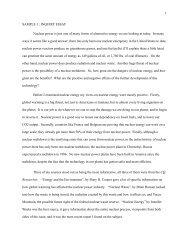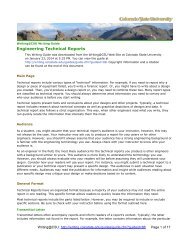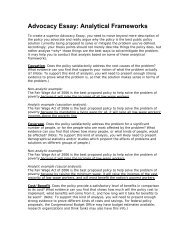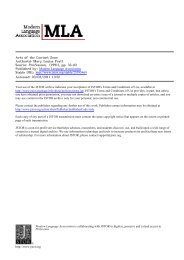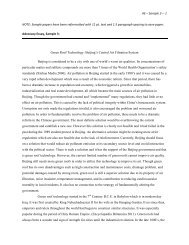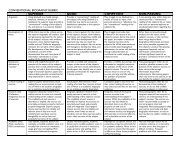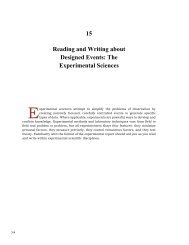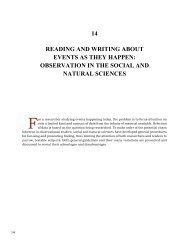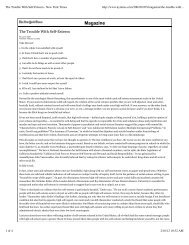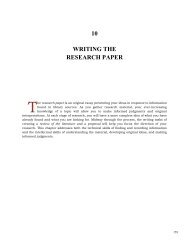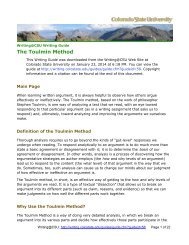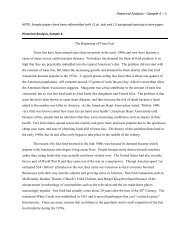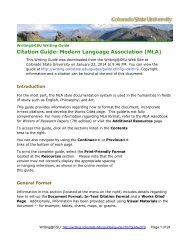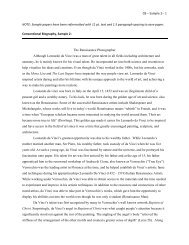Helping Students Use Textual Sources Persuasively Margaret Kantz ...
Helping Students Use Textual Sources Persuasively Margaret Kantz ...
Helping Students Use Textual Sources Persuasively Margaret Kantz ...
Create successful ePaper yourself
Turn your PDF publications into a flip-book with our unique Google optimized e-Paper software.
82 College English<br />
argument as consisting of claims proved with data and backed by ethical claims<br />
called warrants. According to Toulmin, any aspect of an argument may be questioned<br />
by the audience and must then be supported with further argument.) In a<br />
rhetorical argument, a fact is a claim that an audience will accept as being true<br />
without requiring proof, although they may ask for an explanation. An opinion is<br />
a claim that an audience will not accept as true without proof, and which, after<br />
the proof is given, the audience may well decide has only a limited truth, i.e.,<br />
it's true in this case but not in other cases. An audience may also decide that<br />
even though a fact is unassailable, the interpretation or use of the fact is open to<br />
debate.<br />
For example, Shirley's sources gave different numbers for the size of the British<br />
army at Agincourt; these numbers, which must have been estimates, were<br />
claims masquerading as facts. Shirley did not understand this. She thought that<br />
disagreement signified error, whereas it probably signified rhetorical purpose.<br />
The probable reason that the Guizots give a relatively large estimate for the English<br />
army and do not mention the size of the French army is so that their<br />
French readers would find the British victory easier to accept. Likewise,<br />
Churchill's relatively small estimate for the size of the English army and his high<br />
estimate for the French army magnify the brilliance of the English victory. Before<br />
Shirley could create an argument about the Battle of Agincourt, she needed<br />
to understand that, even in her history textbooks, the so-called facts are claims<br />
that may or may not be supported, claims made by writers who work in a certain<br />
political climate for a particular audience. She may, of course, never learn this<br />
truth unless Dr. Boyer teaches her rhetorical theory and uses the research paper<br />
as a chance for Shirley to practice rhetorical problem-solving.<br />
For most of her academic life, Shirley has done school tasks that require her<br />
to find main ideas and important facts; success in these tasks usually hinges on<br />
agreeing with the teacher about what the text says. Such study skills form an essential<br />
basis for doing reading-to-write tasks. Obviously a student can only use<br />
sources to build an argument if she can first read the sources accurately (cf.<br />
Brown and Palincsar; Luftig; Short and Ryan). However, synthesizing tasks<br />
often require that readers not accept the authors' ideas. Baker and Brown have<br />
pointed out that people misread texts when they blindly accept an author's ideas<br />
instead of considering a divergent interpretation. Yet if we want students to<br />
learn to build original arguments from texts, we must teach them the skills needed<br />
to create divergent interpretations. We must teach them to think about facts<br />
and opinions as claims that are made by writers to particular readers for particular<br />
reasons in particular historical contexts.<br />
Reading sources rhetorically gives students a powerful tool for creating a persuasive<br />
analysis. Although no research exists as yet to suggest that teaching students<br />
to read rhetorically will improve their writing, I have seen its effect in successive<br />
drafts of students' papers. As mentioned earlier, rhetorical reading<br />
allowed a student to move from simply summarizing and evaluating her sources<br />
on local coverage of the championship football game to constructing a rationale<br />
for articles that covered the fans rather than the game. Rhetorical analysis enabled<br />
another student to move from summarizing his sources to understanding



